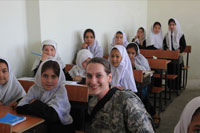
Learning From a Distance
Story by Adam Evans and Photo by Marissa Carlton
Getting a college degree is not an easy thing to do; getting a master’s degree is even more difficult. Throwing in a full-time job serving in the United States of America’s Air Force while taking classes over the Internet from various locations around the world makes it seem close to impossible.
Marissa Carlton, a personnel officer for the United States Air Force, is completing her master’s degree in agricultural education at Texas Tech University by relying solely on distance education. Carlton, who received her undergraduate degree in animal science from Texas A&M University, has served overseas and is currently in Washington D.C. working at the Pentagon.
“In the Air Force, I have to have a master’s,” Carlton said. “I chose Texas Tech because they had the Ag Ed. program, which went along with what I could see myself doing after the Air Force.”
Carlton said she also chose Texas Tech as it has one of the most advanced distance-learning departments. She said the professors understood the challenges of being a distance student and worked with all of the students to help them stay on track.
Jon Ulmer, assistant professor of agricultural education at Texas Tech, is one of the leaders for distance education in the department.
“Texas Tech is striving to be the best when it comes to distance education,” Ulmer said.
The Department of Agricultural Education and Communications plans to grow their distance education program. Ulmer said the department would ultimately like to have the majority of the classrooms in their building capable of delivering distance education.
With the new technology that is used, most of the lectures are posted to the Internet for the students to download and watch when convenient. Ulmer said it really takes a certain kind of person to be able to complete their entire graduate degree using distance courses.
“I really admire our distance students and how they have to discipline themselves,” Ulmer said.
Carlton said that it takes a big devotion to being well-organized and able manage your time.
While stationed in Afghanistan, Carlton said it was difficult to stay caught up. She said that because it could take up to two hours to download 10 minutes of a lecture, it took almost a whole week to watch an entire lecture.
“The professors had to be a little patient with me at times,” Carlton said, “but come Hell or high water, I was going to get my work done.”
Carlton said the professors’ flexibility really helped because her work schedule was so unpredictable.
“I was able to build a rapport with the professors,” Carlton said, “so they knew I was always either a week ahead or at least on time.”
Carlton said the Texas Tech distance education program is a prime example of what other schools should try to be like because it is successful and helpful to its students.
So whether it’s walking a mile and a half through Afghanistan in combat gear to get to the office or providing for a family, Texas Tech’s distance learning programs can help to continue an education with the flexibility needed for everyday life.